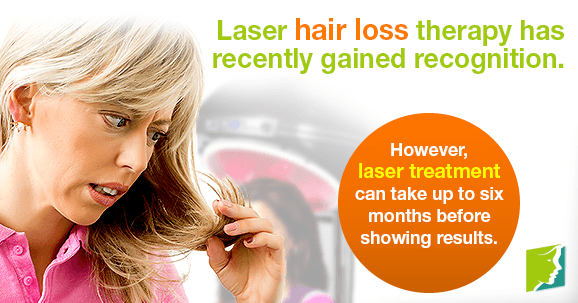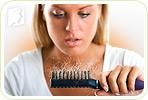Hair loss goes hand in hand with aging. Hairs rest in tiny holes in the skin called follicles. Over time, hair follicles shrink, resulting in hair thinning and loss. Hair loss can also be worsened or triggered by a number of things, such as hormone fluctuations, excessive stress, harsh chemical treatments and dyes. Laser treatment is a new therapy option that has recently gained recognition for being a noninvasive and chemical-free alternative. Given its relatively new status as a treatment option, there is mixed evidence about its effectiveness. Keep reading to learn more about laser treatment.
Laser Treatments: Benefits
Laser treatment delivers a low-level laser directly to the scalp to stimulate cellular activity that supposedly strengthens and thickens hair follicles. The light from the laser affects the body when the light is absorbed by the target tissue. Consequently, the body responds physically and chemically by working off the excess energy from the laser.
Laser treatment can be administered in the clinic by a “hood” - not unlike the hoods at beauty parlors - with a physician's supervision. Panels in the "hood" deliver a measured laser dose to a specific area of the scalp for a designated amount of time.
Laser treatment can also be done at home with a handheld device. Handheld devices have significant differences in their coverage area, power output, number of laser diodes, and cost. However, they generally share the same laser wavelength. Most hand help laser devices have been cleared by The Food and Drug Administration (FDA), but the companies continue to do research and tests on their safety and effectiveness.
Effectiveness and Use
Medical experts generally agree that laser treatment should only be an option for people with inherited hair loss diseases, like alopecia. There is no sufficient evidence that shows if laser treatment works for menopausal hair loss or hair loss caused by lifestyle factors (e.g., stress and harsh chemical treatments). Laser treatment can also take up to six months before showing any kind of results. It may also require several sessions over this time.
Other Treatment Options
Hair loss is a natural part of aging, but there are several treatments that can help prevent hair loss. Laser treatment is an option, but currently not enough evidence has surfaced about its effectiveness. It is advised to do more research and to talk with a healthcare professional before opting for laser treatment. Herbal remedies have been known to be beneficial in nourishing hair. In addition to these treatment options, it is important to prevent hair loss by avoiding certain things, like using harsh chemicals, excessive styling with hot tools, and hard brushing.
Sources
- Avram, M.R. et al. (2007). The current role of laser/light sources in the treatment of male and female pattern hair loss. Journal of cosmetic and laser therapy, 9(1), 27-28. Retrieved from http://www.ncbi.nlm.nih.gov/pubmed/17457763
- Murata, K. et al. (2013). Promotion of hair growth by Rosmarinus officinalis leaf extract. Phytotherapy research, 27(2), 212-217. doi: 10.1002/ptr.4712
- National Institutes of Health. (2014). Hair Loss. Retrieved October 21, 2014, from http://www.nlm.nih.gov/medlineplus/hairloss.html
- The Hair Foundation. (n.d). Hand-Held Laser Devices as Hair Loss Treatments. Retrieved October 21, 2014, from http://hairfoundation.org/hair-loss/hair-loss-treatment-laser.htm
- Office on Women's Health. (2008). Skin and Hair Health. In: The Healthy Woman: A Complete Guide for All Ages. Retrieved from http://www.womenshealth.gov/publications/our-publications/the-healthy-woman/skin_hair.pdf
- Park, S. , Shin, W.S. & Ho, J. (2011). Fructus panax ginseng extract promotes hair regeneration in C57BL/6 mice. Journal of ethnopharmacology, 138(2), 340-344. doi: 10.1016/j.jep.2011.08.013




